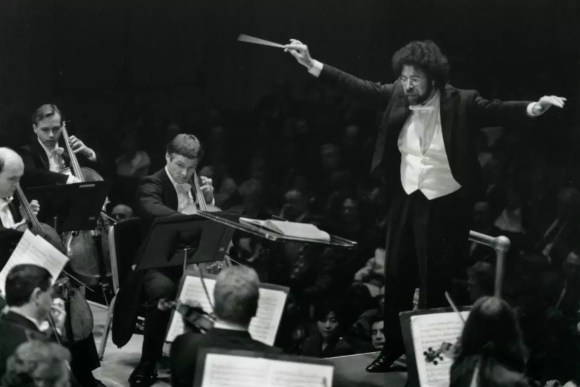
It was the evening of 20th April, 2001. A bespectacled figure with a bushy beard mounted the podium of the Deutsche Oper Berlin to rapturous applause. The conductor was the controversial Venetian, Giuseppe Sinopoli; the opera, Verdi’s Aida. Sinopoli had quit as chief conductor of this very opera house in 1990 due to a rift with its artistic director, Götz Friedrich. They had since made peace, however, and Friedrich’s death in 2000 was the catalyst for Sinopoli’s return to the Opera’s podium. Sinopoli dedicated that night’s performance of Aida to Friedrich’s memory.
In the middle of Act 3, Sinopoli suddenly collapsed in a heap. The performance grinded to a panicked halt. He was given emergency resuscitation and rushed to a hospital nearby. Doctors tried to revive him, but their efforts were in vain. Time of death: 23:15. A giant had fallen — quite literally.
Sinopoli’s death at 54 robbed the world of a musician who defied all attempts at categorization. To the public eye, he was first and foremost a conductor who directed some of the world’s greatest orchestras and opera houses. But he started his career in music as an avant-garde composer, having studied with Bruno Maderna and Karlheinz Stockhausen among others — indeed, his modernistic proclivities informed his choice of repertoire in his early recordings of Busotti, Maderna, Manzoni, and Schoenberg. In addition, he was a psychoanalyst, psychiatrist, criminal anthropologist, and collector of Greek ceramics, and was working on his doctorate in archaeology (Egyptology) until his untimely death intervened. He was a true “Renaissance man”.

“With the passing of Giuseppe Sinopoli we have lost a conductor who was young in years but whose manner was reminiscent of days long past. He would quote Byron to explain Schumann’s Manfred Overture, thank his Japanese hosts with spontaneous haikus, telephone his family in Rome after a performance to dictate a Greek exercise to his eldest son.“
Tribute from Sinopoli’s executive producer at Deutsche Grammophon, Ewald Markl, in the booklet notes of Deutsche Grammophon release 471 451-2
Sinopoli’s eclectic pursuits and boundless intellectual curiosity informed his highly individualistic approach to music-making. He devoted extensive rehearsal time to lecturing orchestras about philosophical matters. He analysed a score to probe into the unconscious minds of the great composers, uncovering repressed contradictions and forgotten longings. He would muse on the significance of Schumann’s bipolar disorder towards his “paranoiac-obsessive” style of composition, as he did in writing the following notes for his recording of Schumann’s 2nd Symphony:

“The paranoiac-obsessive aspect of Schumann’s music must be understood not simply as a medical datum in the composer’s biography, but as one of the fundamental components and elements of his actual composition. (…) [The composition] is the graphic recording of an unstable frenetic condition that oscillates between moments of positive, mounting exaltation and of morbid depression, in an individual whose psychic lability found amplification in the whirlpool instability of the actual material of music.“
from Some Notes of Health and Illness in Schumann’s Invention in the Second Symphony (transl. by Martin Cooper), in the booklet notes of Deutsche Grammophon release 410 863-2
As a conductor, he was a polarising figure, both to musicians and the audience. Never the most physically graceful of baton wielders, he allegedly lacked technique (too much mirroring of the hands?), and his tempi was often inconsistent between rehearsal and concert. Fellow conductors, most notably Leonard Bernstein, didn’t have a high opinion of him. He stoked the most controversy during his tenure as principal conductor of the Philharmonia Orchestra from 1984 to 1994, where the British musical establishment maligned him for his idiosyncratic approaches to Mahler and Elgar, among other composers. He was much less contested in his interpretations of opera, however, and his tenure with the Staatskapelle Dresden from 1994 onwards was warmly received. Nevertheless, even after his death, his contribution to music remains a debated topic. Some detest his “slow speeds and mannered, sometimes lifeless phrasing” (Nice, 2001), while others admire him for his unique musical personality and insightful interpretations.
I tend to fall in the latter camp. Of course, Sinopoli had his ups and downs, but on the whole, his discography is no less consistent than any number of high-profile conductors you may care to name. Moreover, Sinopoli at his best effortlessly married keen analyticity and febrile, almost neurotic, intensity; his style was a veritable fusion between the heights of the brain and the depths of the soul. Listening to a great Sinopoli recording is a uniquely stimulating yet exhausting experience; he gets to the heart of the score and brings to light a wealth of musical details and relations, yet simultaneously sweeps the listener up in a whirlwind of lush sonorities and raging passion.
On the (belated) 20th anniversary of this singular conductor’s death, I offer a roughly chronological retrospective of some of his most notable orchestral recordings.
